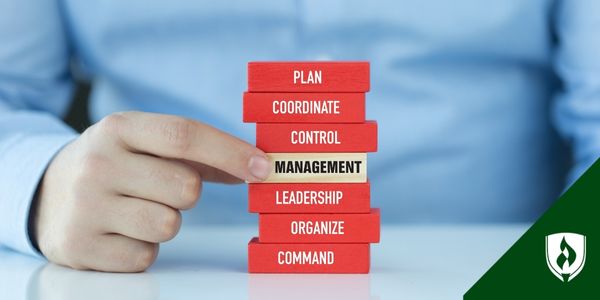
Retail is part of daily life for everyone. Whether it’s groceries, electronics or that perfect outfit, there’s always a retail manager helping things run smoothly behind the scenes.
If you’ve been working in retail, you already understand how fast-paced this environment can be. You know what it takes to keep shelves stocked, help customers and support your team. But have you thought about leading the floor instead of just working on it?
Retail managers play a key role in store success, team performance and customer experience. If you have strong people skills, enjoy solving problems and want to grow in your career, retail management might be your next step.
Let’s look at what it takes to become a retail manager—and how to keep moving forward once you get there.
7 Steps to become a retail manager
You don’t have to leap straight into a leadership role. Many great managers start by learning on the job.
If you’re already working in retail, here’s how to take the next step.
Build your retail experience
Most retail managers don’t start in charge. They start on the sales floor. Effective retail management isn't about waltzing into the place and acting better than the people you work with, it's about knowing what needs to get done, and by whom.
Entry-level roles like cashier, sales associate or stock clerk help you understand how a store works day to day. You’ll get hands-on experience using POS systems, handling customer inquiries and working as part of a team. All of that helps build the foundation for strong customer service and people skills.
If you are already there, you are in the perfect position to start working towards management.
Learn how the store really works
As you gain experience, take time to learn what goes on behind the scenes. How does your store manage inventory? What’s the process for opening and closing? How are sales goals tracked? What do the people in leadership do to achieve sales targets?
Watch how your current manager handles inventory management. How do they handle customer satisfaction surveys or meetings? How do they make decisions? You can learn a lot just by paying attention.
Grow the skills that matter
Strong retail managers have more than just experience—they have the right mix of skills to lead a team and keep the store running smoothly. Customer service skills can translate well to leadership! When you focus on hearing someone out, then finding a solution to a problem, you can create a strong work culture.
People skills
- Leadership
- Communication
- Conflict resolution
Operations skills
- Time management
- Inventory control
- Visual merchandising
Strategic skills
- Decision-making
- Problem-solving
- Tech proficiency (like using sales data or analytics tools)
Consider formal education
While many retail managers move up through experience, some choose to pursue a degree in business management or a related field to strengthen their knowledge of leadership, marketing and financial management.
Online courses and training programs can also help sharpen your retail management skills, even while you keep working the job that's giving you valuable experience. Our business programs are designed for people who are working. And the curriculum uses real-life scenarios and projects instead of memorization and tests.
Let your manager know you’re ready
Once you’ve built up experience and skills, tell your manager that you are serious about growing. Ask for feedback, take initiative and volunteer for new responsibilities—like leading team huddles or helping with store promotions.
Some companies even have special training programs for aspiring retail managers. It’s common to move up within a company, so the skills you learn in your current role can lead to a promotion.
When you show you’re ready to step up, you’re more likely to be considered for a promotion when the time comes.
Hit the job market
If you've done everything you can in your current position and still waiting on opportunities for growth, maybe it's time to look elsewhere.
The job market for retail store manager positions is full of opportunities, but it can also be competitive. Retail managers are needed everywhere, from supermarkets and clothing stores to electronics and specialty shops. Here are a few ways to stand out.
Tailor your resume
Highlight the experience you have, like leadership roles and your retail experience. Show real results, such as how you improved sales or made customers happier.
Network with people in the industry
Build relationships with managers and directors. Go to job fairs and be active on sites like LinkedIn.
Be ready for interviews
Practice talking about your experiences. Focus on how you solved problems, led teams, and met customer needs and expectations.
Stay in the know
Keep up with the latest trends in retail. Learn about customer preferences and new tools for digital marketing and e-commerce. You can show that you’re ready to help your retail business grow.
Consider roles beyond the store
One of the best things about being a retail store manager is that it can lead to bigger opportunities. The skills you learn—like leading a team, managing a budget and connecting with customers—can be used in many different careers.
Moving beyond a store, you might become a regional manager, market director or district manager.
While a retail store manager oversees one location, these higher-level roles often manage multiple projects and locations. This requires even stronger leadership and management skills. To get ready for these jobs, you might consider more education or special leadership programs.
Retail manager skills that make a difference
To be an effective retail manager, you need more than just experience. You need the right mix of skills to lead a team and keep the store running smoothly. A great retail manager knows how to balance the human side of leadership with the business side of keeping a fast-paced retail environment thriving.
Skills for store operations
These are the skills you need to manage the day-to-day business of a store.
- Operations management: This is about running the logistics and functions of a store.
- Financial management: You need to understand the money side of things, like budgets and store costs.
- Inventory control: This means keeping track of products so you always have what customers want without having too much.
- Analytics tools: You need to be comfortable using technology to look at sales data so you can make smart choices.
- Visual merchandising: This is the skill of making the store look good to attract customers
People skills to build a great team
Being a leader is all about working with people. These soft skills help you build a positive and productive team.
- Team management: This is about leading and motivating your team to work together.
- Employee relations: You need to be good at talking to your team and solving problems.
- Positive work environment: This means creating a place where your team feels happy and supported.
- Performance feedback: You're the one who helps your team get better by giving them clear and helpful advice.
- Interpersonal skills: These are the skills you use to connect with people, like being patient, understanding, and kind.
For more on this, check out Empowering Teams Should Be a Manager's Top Priority: Here's How to Do It.
Strategic skills for long-term success
These are the skills that help you think bigger and plan for the future.
- Decision-making: You have to be able to make informed choices for the store.
- Problem-solving: When a challenge comes up, you need to be able to fix it.
- Tech proficiency: This involves knowing how to use things like point-of-sale systems and analytics tools to improve sales.
These skills will help you lead a successful team, grow your store, and become a really good retail manager.
Common questions about becoming a retail store manager
You might still have some questions! Retail store manager is a very broad range of jobs. And the answers all depend on for what company, what industry, when and where--but here are some general answers.
1. Is a college degree required to become a retail manager?
Nope! Many aspiring retail managers start with a high school diploma and work their way up through hard work and on-the-job training. However, a formal degree can significantly accelerate your career path.
An associate's or bachelor's degree in business or a related field can give you a competitive edge. It provides a solid foundation in key business skills like finance, marketing and human resources, which are essential for a successful retail manager.
Many large retailers also offer internal management training programs for dedicated employees.
2. What does a typical day look like for a retail manager?
A typical day is anything but typical, and that’s what makes the job so dynamic!
A retail manager might start the morning by reviewing sales data and setting daily goals.
The rest of the day could involve a mix of tasks, such as...
- Motivating and coaching staff on the sales floor.
- Managing inventory, including receiving shipments and conducting stock counts.
- Handling administrative tasks and paperwork.
- Addressing customer complaints or special requests.
- Implementing new sales strategies or promotions.
- Ensuring the store is clean, well-organized and visually appealing.
3. How long does it take to become a retail store manager?
There is no single answer, as the path varies widely. For some, it may take just a couple of years of dedicated work in an entry-level position to get promoted to a management role. For others, it can take longer, especially if they are also pursuing a degree. Gaining experience in various store departments and demonstrating leadership potential are the fastest ways to advance.
The journey is less about a set timeline and more about consistently proving your ability to take on more responsibility and drive results.
The role of education in retail management success
If you're looking to gain new skills or take your career to the next level, you might want to consider going back to school. Getting a business degree can help you build on the skills you already have.
In today's retail industry, new things are always popping up, like e commerce platforms and social media shopping. Getting a degree in business or business administration can give you the skills you need to keep up with these changes and get ahead. It can help you learn how to use sales data to make smart choices, manage an online store and even deal with new trends like chatbots and social commerce.
A truly effective retail store manager knows how to find a balance. They stay calm under pressure, adapt to change, and lead with confidence. By balancing the human side of leading people with the business side of day to day operations, you will see a lot of success.
For more insights into related career paths, see What Can You Do with a Business Management Degree? Understanding Your Options.




